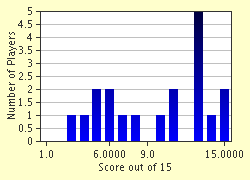Quiz Answer Key and Fun Facts
1. The film opens with Louise Banks narrating a story to her daughter, Hannah, over a montage of memories depicting their time together. What does Louise talk about in her narration?
2. Colonel Weber from U.S. Army Intelligence approaches Louise for help in translating the aliens' communications, but he cannot agree to her conditions. When he threatens to go to Danvers, her rival in Berkeley, she tells Weber to ask him the Sanskrit word for "war" and its translation. What response does Danvers provide to the question?
3. Louise travels to the landing site of the alien ship in Montana and begins work on communicating with the heptapods. She makes little progress deciphering their verbal exchanges, then has a breakthrough when she tries something different. What?
4. Louise and Ian Donnelly formally introduce themselves to the heptapods, and learn that they have names too. For convenience, Ian suggests naming them after a famous comedy duo. What do they call the two aliens from that point?
5. Ian talks to Louise about the Sapir Whorf hypothesis, a theory in linguistic relativity that postulates that the way a person thinks is influenced by the language they speak. What does Ian say can be an effect of immersing yourself in a foreign language?
6. Louise becomes concerned when she learns that the Chinese site may be using a game to communicate with their heptapods, as it means that every idea will be expressed through conflict, with a 'win' on one side corresponding to a 'loss' on the opposing side. What traditional Chinese game does she fear the Chinese are using to converse with the aliens?
7. Weber forces the Montana team to ask their heptapods the "big question", which is "What is your purpose on Earth?" How does Louise translate the heptapods' response?
8. Ian and Louise re-enter the shell to clarify the heptapods' message, and receive a data dump from them consisting of a tapestry of hundreds of logograms. Their session is cut short, however, by a squad of rogue soldiers who, suspicious of the aliens' intentions, take matters into their own hands. What do they do?
9. The scientists race against time to interpret the tapestry of logograms as events outside of their control threaten to undo the progress that they have made. Ian makes the discovery that the tapestry is incomplete, and that there 11 times as many gaps as there are logograms. The significance of this isn't lost on Louise. What do Ian and Louise believe this means?
10. As Louise and Ian try to convince the others of the correctness of their theory, Ian uses a phrase that happens to be the answer to a question that Louise is asked by her daughter, Hannah, who is looking for a "more science-y" term for a win-win situation. What is the answer (supplied by Ian in Montana) that Louise provides her daughter?
11. Realizing what she must do, Louise pays one last visit to the Montana shell to converse with the heptapods. In the process, the audience realizes that the flashbacks Louise has been having throughout the film are not recollections of memories, but something else entirely. What?
12. A seven-year-old Hannah is standing with Louise by the side of the lake. She is worried that Louise is going to leave her, just like her Daddy. Louise comforts her daughter by explaining as best she can why her Daddy left. What does Louise say?
13. Louise begins actively using the heptapods' gift, and it allows her to come face to face with General Shang in an unexpected setting. Where?
14. Back in Montana, Louise has very little time to avoid what could turn out to be a global war with the heptapods. She borrows Halpern's sat phone and uses it to dial General Shang's private number. What does she tell him over the phone to make him change his mind about the attack?
15. With the crisis averted, Louise and Ian remain in the field in Montana decompressing from the hectic events of the last several weeks. Some time later, they embrace in the lake house as Ian asks Louise an important question. What?
Source: Author
jmorrow
This quiz was reviewed by FunTrivia editor
skunkee before going online.
Any errors found in FunTrivia content are routinely corrected through our feedback system.

